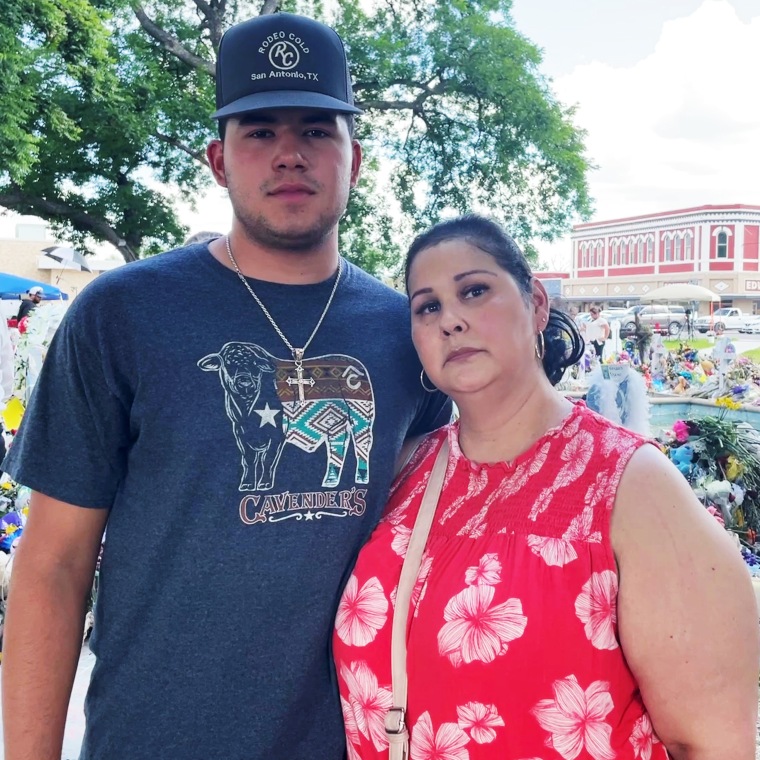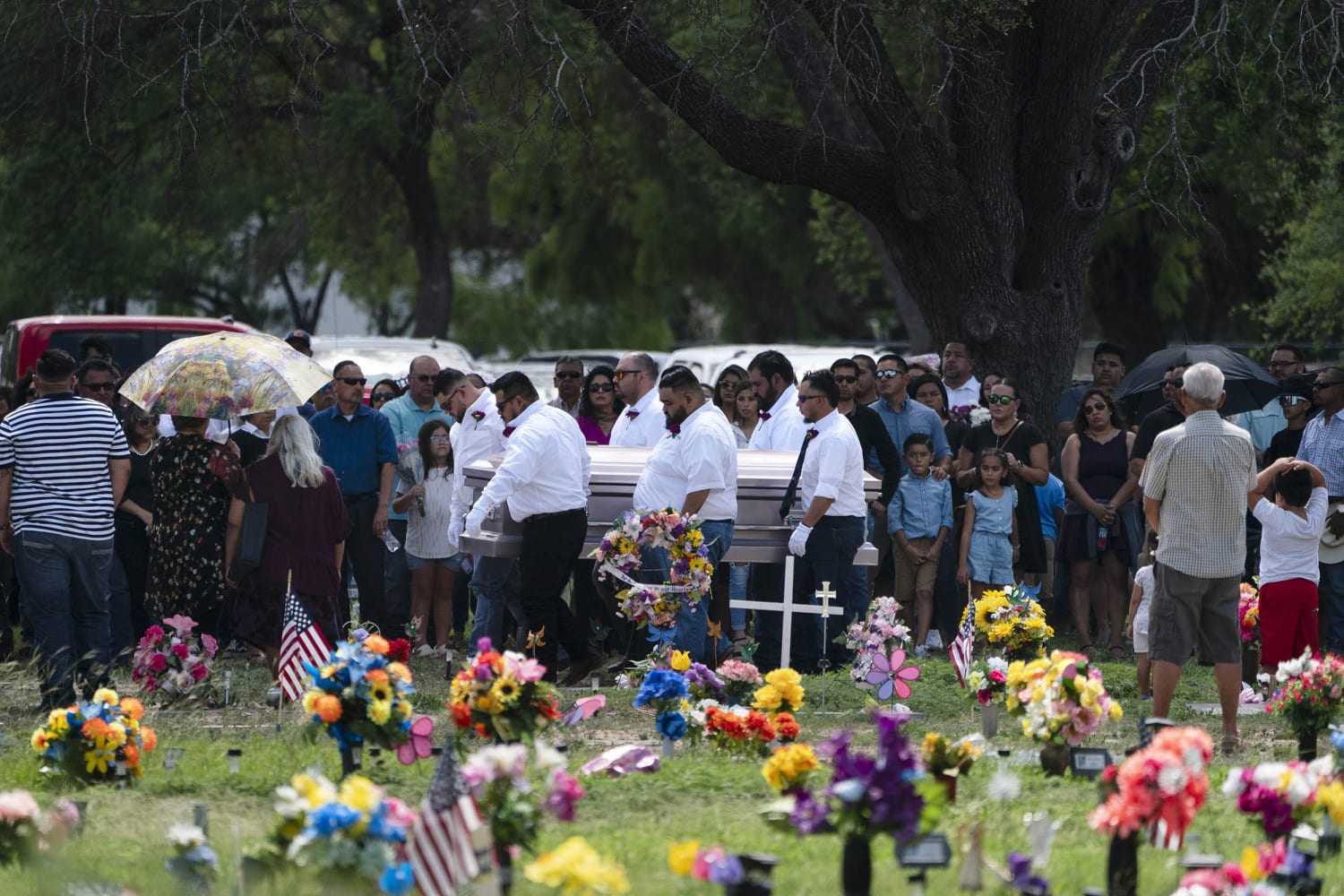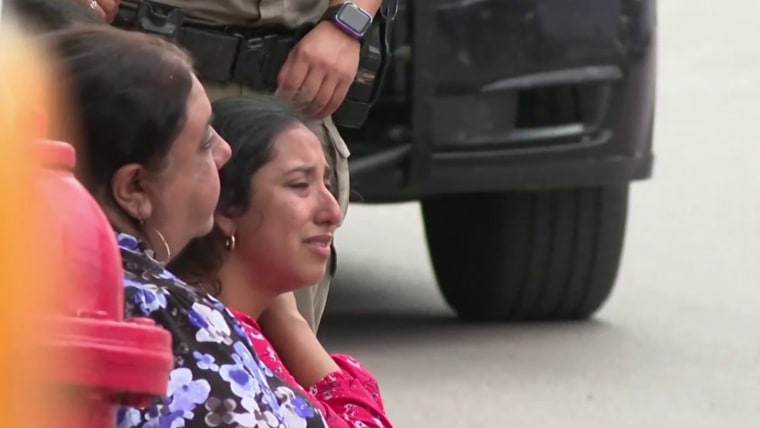UVALDE, Texas — In the cemetery where some of the 21 victims of the recent elementary school shooting are being buried, Arnoldo Treviño Diaz declined to hold guns at fault, but he said he’d support stricter age restrictions on gun purchases.
Diaz, a Marine veteran who worked as a military police officer, pointed out that to carry a handgun for that job, he had to be 21. Those who aren’t 21 have to get an adult to sign the paperwork to allow them to carry guns under federal law, he said.
“At 18, you are barely out of high school. You are just starting to learn responsibility,” said Treviño, who attended the funeral and burial of Amerie Jo Garza, 10, a distant cousin.
Gun violence isn’t often discussed in the context of Latino communities, even though, according to research, Latinos are disproportionately affected by firearms violence.
But Latinos are and have been at the very center of gun violence, historically and more recently. The gunman in the 2019 shooting massacre in El Paso, Texas, targeted Latinos, several of whom were among the 23 people who were killed and the dozens more who were wounded. The attack at the Pulse nightclub in Orlando, Florida, in 2016 was on Latino night, and again, many Latinos were among the 49 people who were killed and the 53 who were wounded. Last week’s massacre took place at Robb Elementary School, where most of the young children who were killed, as well as the two teachers, were Latino.
Heading into the 2020 election, gun policy ranked ninth out of 12 issues of importance to Latinos in a Pew Research Center survey.
Despite the low ranking, Latinos are big backers of gun restrictions. In a Pew survey conducted about five months after the El Paso massacre, nearly 7 in 10 Hispanic voters (68 percent) said gun laws should be stricter than they were at the time of the survey, while about a quarter (24 percent) said they were fine as they are and 7 percent said they should be less strict.
“When we think about gun violence, we should be thinking about how this has a disproportionate impact on the Latinx community and how oftentimes this is not necessarily in the conversation,” said José Alfaro, the director of Latinx leadership and community engagement for Everytown for Gun Safety, a gun restrictions group.
But the survey did show a partisan divide when it comes to Latinos’ views on gun laws. Eighty percent of Hispanic Democrats agreed that gun laws should be stricter, Pew found. However, Latino Republicans “are more evenly divided,” with 44 percent saying gun laws should be stricter and 42 percent siding with current gun laws. Pew conducted its survey four months after the El Paso shooting, which authorities said targeted Mexicans.
The deaths of Uvalde’s schoolchildren had many Latinos discussing the country’s gun laws.
Ryan Garza, 20, who is a reservist, said he bought an AR-15 when he turned 18, because he had always wanted one and wanted one for home defense and hunting. His truck had been broken into a few times, but, he said, he hadn’t had a home invasion. He opposes raising ages for gun purchases.

“I believe it’s a mental issue. I think we should have kept an eye out for what he [the gunman] was posting on social media. … I believe his friends, his ex-friends, should have said something sooner,” Garza said.
His mother, Roxane Cortez, 47, said emphatically that she had a totally different outlook.
“Twenty-one, no matter what,” said Cortez, of San Antonio, referring to the age limit for people to buy arms.
“I believe there should be more extensive background checks. I believe social media, Meta, any time guns are posted, any threat, needs to be stopped,” she said.
Gun ownership among Latinos grew after the El Paso shooting, according to the National Shooting Sports Foundation, a firearm trade association. Its retail data indicated that during the first six months of 2020, Latinos bought guns at a 49 percent higher rate than they did during the same period in 2019.
However, only about 9 percent of people who purchased guns in the first half of 2020 were Hispanic. Nearly 7 percent were Hispanic males, and 2.2 percent were Hispanic females, according to the association.
Alfaro said 4,100 Latinos are killed and 13,300 are wounded by firearms every year. Latinos are twice as likely to die in gun homicides and four times as likely to be wounded in assaults with guns than white people. The Latinos who bear the brunt are children and teenagers, he said. His group isn’t advocating to ban guns, but it wants better policies around guns that allow communities to be safe, he said.
Alfaro said that he has been in his novel role of doing outreach to Latinos on gun policies for a year and half.
After the El Paso massacre, the Latino-led group Latino Victory held a town hall to amplify the gun violence issue among Latinos.
In a rural area like Uvalde, gun ownership isn’t uncommon. But often there is a tempered view among Hispanics who do own them.
Dominic Valdez, 20, of Eagle Pass, was distributing “Uvalde Strong” bumper stickers his boss created at the memorial. He said guns define who we are as a nation. The Founding Fathers said we should have guns, he said.
“But they deserve to be regulated,” he said. The Second Amendment, when it was written, covered muskets — “you couldn’t own a cannon,” he said. He suggested that guns be regulated the same way driver’s licenses are, with regular permit renewals and competency tests.
If people’s eyesight is impaired and they can’t pass driving tests, they are prohibited from operating motor vehicles. Similar skills exams should be used for guns, he said.
Javier Cazares, the father of Jacklyn Cazares, one of the children killed in the Uvalde massacre, told The Associated Press that he is a gun owner and a supporter of the Second Amendment. But he also said should be stricter gun laws, including better background checks.
Selling the type of gun the assailant used to an 18-year-old is “kind of ridiculous,” he told the AP.
Elizabeth Delgado, who also drove from her home in San Antonio to visit the memorial, wants even tougher restrictions. She said 25 is a good starting age for gun purchases.
“Heavy-duty guns should be more regulated so something like this, it’s harder to happen,” he said.
‘I am so angry. … Politicians don’t react’
Some of the 17 people who were killed in the shooting at Marjory Stoneman Douglas High School in Parkland, Florida, in 2018 also were Latino. One of the survivors, Emma Gonzalez, became a prominent anti-gun activist.
So have the parents of one of the victims, Joaquin Oliver. The Venezuelan American couple quit their jobs after their son was killed, and they have dedicated their lives to advocating for gun control measures.
“I am so angry,” said Patricia Padauy-Oliver, Joaquin’s mother. “I am angry, because we keep seeing these tragedies and we’re stuck. Politicians don’t react. They do too little, and that’s not acceptable.” She said mass shootings lately are worse than ever. “We live in war, but it’s not called war,” she said.
Manuel Oliver, Joaquin’s father, climbed a crane in Washington, D.C., on the anniversary of the shooting this year and tweeted a video under the heading “Happy valentines.”
Oliver says in the video: “The whole world will listen to Joaquin today. He has a very important message. I asked for a meeting with Joe Biden a month ago. Never got that meeting.”
The couple advocate for universal background checks and bans on so-called assault weapons and high-capacity magazines. “Those are made for war, and we shouldn’t be allowed to carry them,” Padauy-Oliver said.
Senate negotiators are trying to hammer out gun legislation on Capitol Hill. The bipartisan group includes no senators from Texas or Florida, the two predominantly Latino states that have been sites of school shooting massacres. Both states have Latino Republican senators.
Gun control advocates have criticized Sen. Marco Rubio, R-Fla., for taking over $3 million from the National Rifle Association.
Asked whether he plans to join the group of senators or would support their legislation, Rubio’s press office referred NBC News to a tweet from Rubio saying, “Many are finally realizing the 2 bills I have been working for 4 years are the best way to prevent mass shootings.”
The tweet listed a bill advocating for “threat Assessments to identify dangerous people” and another to allow police “to intervene before threats lead to murder.”
Sen. Ted Cruz, R-Texas, said at the National Rifle Association’s convention in Houston days after the Uvalde shooting that the problem is “elites who dominate our culture” and “tell us that firearms are the problem.”
“What stops armed bad guys is armed good guys,” Cruz said.
He was later confronted at a restaurant by a man who was identified as Benjamin Hernandez, a board member of Indivisible Houston, a progressive advocacy group.
The man asked why Cruz went to the convention “when 19 children died.” A video posted on social media shows him yelling as he is pulled away by security: “That’s on your hands, Ted Cruz!”
Suzanne Gamboa reported from Uvalde, Texas, Carmen Sesin from Miami and Nicole Acevedo from San Juan, Puerto Rico.
Follow NBC Latino on Facebook, Twitter and Instagram.
Source: | This article originally belongs to Nbcnews.com











